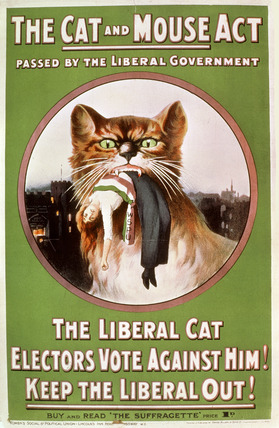
The 1913 Prisoners (Temporary Discharge for Ill-Health) Act was an elegant way of nullifying the women prisoners who were using hunger strikes for publicity. The government was irritated by the suffragette movement (the lesser of two constitutional crises* they faced), for which they had no effective response as out-and-out repression of women wasn’t an option in Edwardian Britain. The government desperately wanted to avoid the possibility of hunger strike martyrs. Such deaths were believed to be a recruiting sergeant for Pankhurst suffragettes. The Pankhurst suffragettes severely embarrassed the government but weren’t irresistible opposition politicians. They failed in their principal objective: the franchise.
The British government in 1913 was faced by two constitutional challenges. The most serious was the existential Irish Home Rule campaign (devolved Irish government). This campaign was compelling because of the swing votes of the Irish in the House of Commons. Asquith’s Liberal party didn’t have an overall majority in Parliament and the Irish kept them in power **. Naturally Prime Minister Asquith had a price to pay: Home Rule. The Parliament Act over-ruled the Lords, who’d been blocking Home Rule legislation and this allowed Home Rule to pass in 1914. Home Rule was passed immediately after the first World War broke out***. Because the war took precedence over everything Home Rule was suspended.
The suffragettes were politically irrelevant. They had no compelling political leverage apart from public opinion. This led to dramatic tactical discussions within the suffragette movement, which split into two sections****. The provocative dynamic group was led by the Pankhursts who developed civil disobedience as a tactic for keeping the movement in the forefront of public attention. Civil disobedience meant committing crimes and waiting to be arrested.
Pankhurst suffragettes used court appearances for publicity. The courts provided a platform as the prosecution outlined their case against them. Suffragettes then declaimed on the motivation for their crimes at length. This mocked the deterrent power of the courts as they showed neither fear nor respect. The legal system lost its meaning. This brilliant tactic provoked, from 1909, an escalation of civil disobedience within the prisons themselves. Prisons were politicised as systems for repression when suffragette civil disobedience used hunger strikes to induce barbaric forced feeding. Forcible feeding had long been used in mental homes but now it was being used against middle-class women. These women knew exactly what they were doing and showed enormous courage in doing it. They knew the risk of permanent damage to their health and the possibility of early death. And so did the government. The ‘Cat and Mouse’ act was their reply. Suffragettes wouldn’t be permitted to die but neither would they be allowed to ‘game’ the system.
Asquith’s government didn’t know how to deal with determined women. The Cat and Mouse Act failed because women were quite prepared to be rearrested and go through the torture of forced feeding again. The Cat and Mouse Act also failed because it outraged an English sense of fair play. The government lost the PR war but the suffragettes failed as well. The end of the first World War in 1918 resolved many social issues and franchise for women was one of them.
*The other was the Irish Home Rule campaign.
**The Liberals had a single seat advantage over the Conservatives in the 1910 general election (272 against 271) and well short of the 336 seats required for a parliamentary majority.
*** The Home Rule Act was passed six weeks after war broke out and was immediately suspended. Home Rule never happened as Ireland was partitioned in 1922.
****The timeline is here:- http://www.parliament.uk/documents/education/docs/suffragettes/suffragettes-timeline.pdf
Chris

Interesting and mostly new to me, (we did Romans at my school)